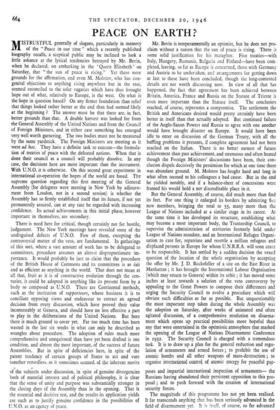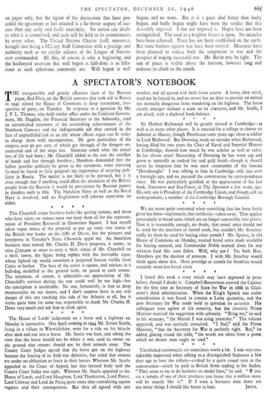PEACE ON EARTH?
MISTRUSTFUL generally of slogans, particularly in memory of the " Peace in our time " which a recently published biography recalls, a sceptical public may be inclined to look a little askance at the lyrical tendencies betrayed by Mr. Bevin, when he declared, on embarking in the ' Queen Elizabeth' on Saturday, that " the sun of peace is rising." Yet there were grounds for the affirmation, and even M. Molotov, who has con- genital objections to anything rising anywhere but in the east, seemed reconciled to the solar vagaries which have thus brought hope out of what, relatively to Europe, is the west. On what is the hope in question based? On any firmer foundation than relief that things looked rather better at the end than had seemed likely at the beginning ? The answer must be that there are, in fact, better grounds than that. A double harvest was looked for from the General Assembly of the United Nations and from the Council of Foreign Ministers, and in either case something has emerged very well worth garnering. The two bodies must not be measured by the same yardstick. The Foreign Ministers are meeting as it were ad hoc. They have a definite task to execute—the formula- tion of treaties of peace with the defeated nations. When that is done their council as a council will probably dissolve. In any case, the decisions here are more important than the instrument. With U.N.O. it is otherwise. On this second great experiment in international co-operation the hopes of the world are based. The supreme question regarding this first meeting of the General Assembly (for delegates were meeting in New York by adjourn- ment from London, not in a second session) is whether the Assembly has so firmly established itself that its future, if not yet permanently assured, can at any rate be regarded with increasing confidence. Its actual achievements in this initial phase, however important in themselves, are secondary.
There is need here for critical, though certainly not for hostile, judgement. The New York meetings have revealed some of the undisguised defects of U.N.O. Few of them, excepting the controversial matter of the veto, are fundamental. In gatherings of this sort, where a vast amount of work has to be delegated to committees, procedure assumes an almost disproportionate im- portance. It would probably be just to claim that the procedure of the British House of Commons and its committees is as fair and as efficient as anything in the world. That does not mean at all that, fruit as it is of constructive evolution through the cen- turies, it could be adopted in anything like its present form by a body so composed as U.N.O. There are Continental methods, such as the institution of rapporteurs, whose business it is to conciliate opposing views and endeavour to extract an agreed decision from every discussion, which have proved their value incontestably at Geneva, and should have no less effective a part to play in the deliberations of the United Nations. But here there is much ground to cover yet. Far too much time has been wasted in the last six weeks in what can only be described as wrangles about procedure. The adoption of rules much more comprehensive and unequivocal than have yet been drafted is one condition, and almost the most important, of the success of future Assemblies. But in spite of deficiencies here, in spite of the patent tendency of certain groups of States to act and vote together regardless. as it sometimes seemed. of the inherent merits of the subjects under discussion, in spite of genuine divergencies both of material interest and of political philosophy, it is clear that the sense of unity and purpose was substantially stronger in the closing days of the Assembly than in the opening. That is the essential and decisive test, and the results its application yields are such as to justify genuine confidence in the possibilities of U.N.O. as an agency of peace. Mr. Bevin is temperamentally an optimist, but he does not pro- claim without a reason that the sun of peace is rising. There is some solid justification for his metaphor. Five treaties—with Italy, Hungary, Rumania, Bulgaria and Finland—have been com- pleted, leaving, so far as Europe is concerned, those with Germany and Austria to be undertaken, and arrangements for getting down at last to these have been concluded, though the long-contested details are not worth discussing now. In view of all that has happened, the fact that agreement has been achieved between Britain, America, France and Russia on the Statute of Trieste is even more important than the Statute itself. The conclusion reached, of course, represents a compromise. The settlement the British and Americans desired would pretty certainly have been better in itself than that actually adopted. But continued failure of the Anglo-Saxon Powers and Russia to agree with one another would have brought disaster on Europe. It would have been idle to enter on discussion of the German Treaty, with all the baffling problems it presents, if complete agreement had not been reached on the Italian. There is no better earnest of future achievement than past achievement, and strenuous and often heated though the Foreign Ministers' discussions have been, their con- clusion dispels decisively the pessimism for which at one time there was abundant ground. M. Molotov has fought hard and long in what often seemed to his colleagues a bad cause. But in the end he yielded notably, and if a balance-sheet of concessions were framed his would hold a not discreditable place in it.
But the General Assembly, of course, did much more than find its feet. For one thing it enlarged its borders by admitting five new members, bringing the total to 55, many more than the League of Nations included at a similar stage in its career. At the same time it has developed its structure, establishing what may become a most important body, the Trusteeship Council, to supervise the administration of territories formerly held under League of Nations mandate, and an International Refugee Organi- sation to care for, repatriate and resettle a million refugees and displaced persons in Europe for whom U.N.R.R.A. will soon cease to be responsible. It has settled by a sudden decision the vexed question of the location of the whole organisation by accepting the offer by Mr. J. D. Rockefeller of a site on the East River in Manhattan ; it has brought the International Labour Organisation (which may return to Geneva) within its orbit ; it has moved some inches at least towards a solution of the veto controversy by appealing to the Great Powers to compose their differences and urging the Security Council to evolve a procedure which will obviate such difficulties as far as possible. But unquestionably the most important step taken during the whole Assembly was the adoption on Saturday, after weeks of animated and often agitated discussion, of a comprehensive resolution on disarma- ment which opens up practical possibilities more hopeful than any that were entertained in the optimistic atmosphere that marked the opening of the League of Nations Disarmament Conference in 1932. The Security Council is charged with a tremendous task. It is to draw up a plan for the general reduction and regu- lation of armaments and armed forces ; to prohibit the use of atomic bombs and all other weapons of mass-destruction ; to organise international contro; of atomic energy for peaceful Iv- poses and impartial international inspection of armaments— the Russians having abandoned their persistent opposition to this pro- posal ; and to push forward with the creation of international security forces.
The magnitude of this programme has not yet been realised. It far transcends anything that has been seriously advanced In the field of disarmament yet. It is itself, of course, so far advanced on paper only, but the rigour of the discussions that have pre- ceded the agreement at last attained is a far better augury of suc- cess than any early and facile unanimity. No nation can doubt to what it is committed, and each will be held to its commitments by every other. The United Nations Charter itself, moreover, brought into being a Military Staff Committee with a prestige and authority such as no similar adjunct of the League of Nations ever commanded. All this, of course, is only a beginning, and the hackneyed assertion that well begun is half-done is as falla- cious as such aphorisms commonly are. Well begun is well begun, and no more. But it is a great deal better than badly begun, and badly begun might have been the verdict that this Assembly imposed. It has not imposed it. Hopes have not been extinguished. The road to a brighter future is open. No miracles have been achieved. Peace has not been established on the earth. But some barriers against war have been erected. Measures have been planned to reduce both the temptation to war and the prospect of waging successful war. Mr. Bevin may be right. The sun of peace is visible above the horizon, however long and arduous its climb to the zenith.



































 Previous page
Previous page